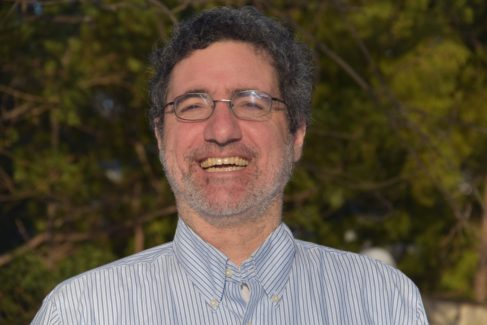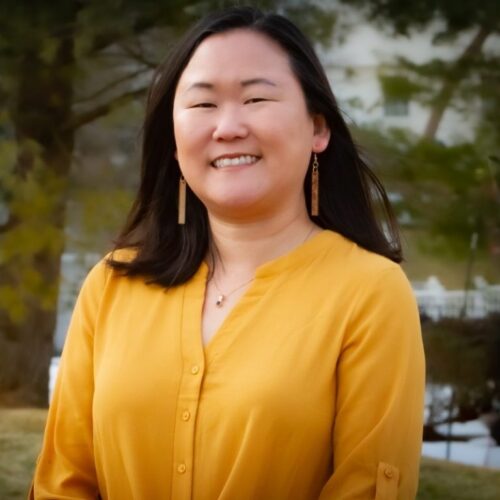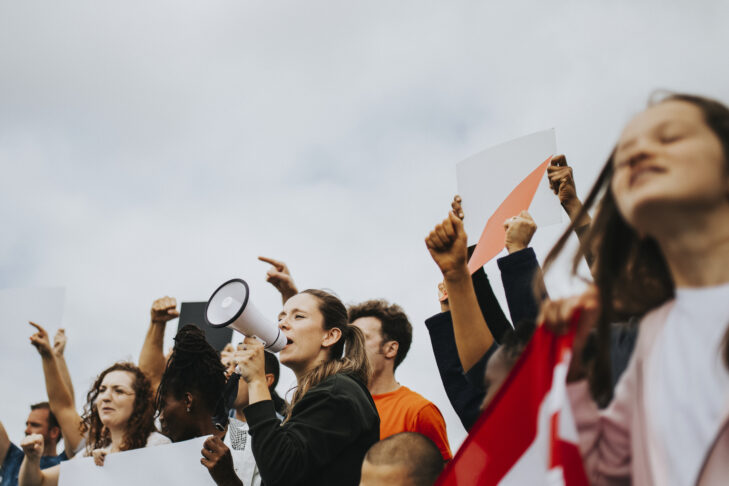Social justice activists Jessica Greenblatt Seeley and Meir Lakein were recently named the new co-executive directors of JOIN for Justice, a Boston-based organization whose mission is “building a powerful field of Jewish leaders capable of effectively organizing for justice, both inside and outside Jewish communities in the U.S.”
Greenblatt Seeley comes to JOIN for Justice as a leader in the environmental and climate justice movements. Lakein has been the director of organizing at JOIN for Justice for over a decade. He has worked as a professional community organizer for over 30 years and founded the JOIN for Justice Clergy Organizing Fellowship, training over 1,000 rabbis to organize for change. In addition, he has provided hundreds of consultations to synagogues and Jewish organizations nationwide, guiding them to become effective change agents.
Greenblatt Seeley and Lakein spoke to JewishBoston about their new roles and plans for affecting social justice at the local and national levels.
Meir, you served as the lead organizer for the Jewish Community Relations Council of Greater Boston. You brought thousands of adults and teens from 14 Boston-area synagogues to identify their common values and interests, develop a common story and mission, and take action to live their lives and defend their interests. How are you implementing that experience in your new role?

Meir Lakein: The most difficult challenge we organizers face in this country is that the real work requires seeing each other’s humanity. It requires forging real relationships and connecting real people. It begins starting within a congregation, an institution, a community, a neighborhood, and then branching out. It has people reaching others who are like them and completely different from them. It is about building that solidarity. And the work has to be done beyond social media to create actual kinship.
The world has become so much bigger and so much smaller at the same time. Both America, the world and the Jewish community will not change because of what happens in other cities.
Boston can’t change based on what happens in Boston anymore. Too many of the decisions happen on a higher level. So much is national right now. People talk about how politics is nationalized. And if we’re talking about where the Jewish community is going, you can’t just look at New York and Los Angeles. You have to look beyond that. Our Clergy Organizing Fellowship, which runs for 18 months, has intentionally not gone to places that are “progressive blue.” We just wrapped up our current round in St. Louis and Miami. The previous round, we worked in Atlanta and Charlotte, North Carolina. We’re going to the hard places because that must be part of the work.

Jessica Greenblatt Seeley: Many of our programs at JOIN are grounded in training Jewish leaders to work toward social change together. Whether that’s through our flagship program, the Jewish Organizing Fellowship that’s been going on for decades in Boston, or working with emerging Jewish social change-makers. We’re placing them in organizations where they are directly on the ground, working within various communities toward effective change, or through some of our newer programs in the last few years. For example, even before the pandemic, we established an online institute to extend our national reach to educate, engage and activate Jewish social change-makers through an online course called “Don’t Kvetch, Organize!”
We’re launching a Jews of Color Organizing Fellowship that’s modeled after the Jewish Organizing Fellowship. But the new fellowship distinctly centers on the needs of Jewish organizers of color, which can be very different when working in a predominantly white space like the current Jewish landscape. Its co-directors—Bryant Heinzelman and Kat Macias—also identify as Jews of color.
Jessica, you are a Jew of color. Will you share your story?
Greenblatt Seeley: I was born in Seoul, South Korea, and adopted by a Jewish family in New Jersey when I was very young. My dad is a music journalist and worked in Manhattan. My mom was a stay-at-home mom. I grew up in dominantly white spaces in suburban and rural areas. This work with JOIN has come at a beautiful time in my life. My background is strongly in environmental and social justice work. I was a young executive director in 2007 when there weren’t a lot of folks of color in the environmental space. However, this is my first professional job that has intersected my Jewish identity and how I identify as a Korean American and a Jew of color. I was drawn to JOIN and the Jews of Color Organizing Fellowship. From my background in the environmental justice field, I had a lot of opinions, ideas and passions about driving programs that center on folks of color.
JOIN for Justice’s mission statement reads, in part: “Many Jewish leaders in communities are acting with passion and outrage, but they risk being ineffective, burning out, or even doing harm and showing disrespect to those most affected by the injustice they seek to address. At the same time, countless more Jews are seething at what they see going on around them but stay still, feeling helpless and unsure of what to do.” How does JOIN for Justice connect people?
Greenblatt Seeley: The work that JOIN is doing to convert that feeling of helplessness, frustration and fear of making mistakes is in our curriculum and our support network. We have a lot of experience in training community organizers on ways to engage and activate. But the wonderful thing about our racial justice initiatives is that they are a multi-pronged approach because we exist in a system. To confront racism and activate impactful change, we will make mistakes. We’ll have some successes, some leverage points, some movements and some power shifts. But to do that, JOIN has tried to focus strategically on the one prong of the individual. How are JOIN’s programs centering on the needs of Jews of color in these predominantly white spaces?
Lakein: Every bit of history indicates the degree to which power can corrupt. We see it happen all the time, both in the country, the world and our communities. But powerlessness can corrupt too. If people feel powerless and hopeless, they can’t do anything. They get frustrated and angry. They lash out at the people closest to them. They start devoting unhealthy amounts of time to screaming at random strangers on social media. So, our work is about teaching our community to harness our power. We are across all those worlds and communities that don’t always know each other or agree. But we talk to everybody and support everybody, which puts us in a unique position to weave people together. One of the first principles of organizing is, “God says, ‘It’s not good for a person to be alone.’” That’s built into how we think and what we should be modeling in working together.



